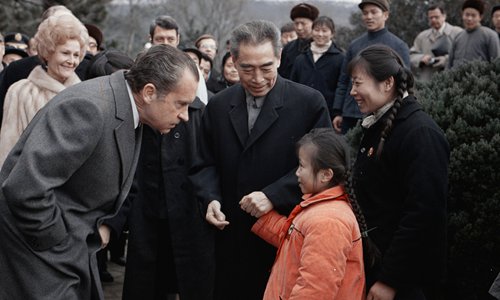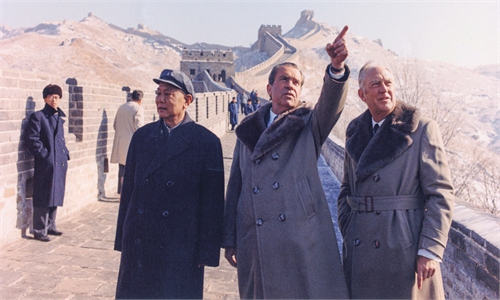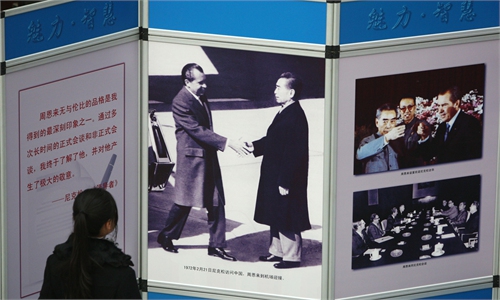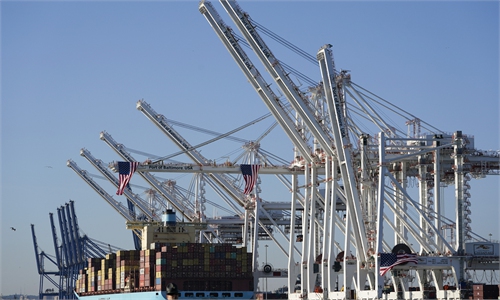
Photo:nixonlibrary.gov
This year marks the 50th anniversary of President Richard Nixon's visit to China. From February 21 to February 28, 1972, then US president Nixon visited China and leaders of China and the US realized a "handshake across the Pacific Ocean." The trip ended the long-term isolation between the two major powers, paving the way for the official establishment of diplomatic relations between China and the US seven years later. It was also called by Nixon "the week that changed the world."
Since then, China-US relations, despite ups and downs, have maintained overall stability in the past 50 years and achieved a situation of mutual benefit and win-win for half a century. In the intricate interactions, competitions and struggles, the two sides have kept expanding and deepening cooperation, forming an interest pattern of "we all have a stake in each other's future" and bringing tangible and considerable benefits and dividends to the peoples of both countries. This has been the mainstream of China-US relations in the past five decades.
50 years on, the bilateral relationship is standing at a new crossroads. Where is the China-US relationship heading? Toward a "decoupling" and confrontation as some Americans are advocating or following the trend to strengthen cooperation as Nixon did? Looking back at Nixon's trip, we find that it has a special significance.
The biggest success of Nixon's trip was that it made two major powers which have obvious differences in terms of ideology, social systems, history and culture realize peaceful coexistence and awakened huge demands for mutual beneficial cooperation between China and the US. Just as Nixon said in his famous departure speech on the?South Lawn?of the?White House before his visit to China, "we must recognize that the Government of the People's Republic of China and the Government of the United States have had great differences… But what we must do is to find a way to see that we can have differences without being enemies in war."
Nixon, with a strong anti-communist label, flew across the Pacific Ocean and he crossed the psychological and political gap between China and the US to create conditions for the comprehensive development of China-US relations. He thus became one of the very few politicians with a strategic vision in US history.
A widely circulated belief goes that it was the Soviet Union, the common enemy of both sides, that pushed China and the US together and because of the lack of a common enemy now, the two have begun to turn hostile against each other. This may explain the direct motives behind Nixon's China visit, but it cannot offer an explanation to why the bilateral relationship has witnessed comprehensive and rapid development over the past five decades or why it has continuously unleashed amazing vitality and vigor after the ice was broken. These could barely be driven by a so-called "enemy." It's the trend of the times with its powerful force that pushed China and the US to where they are today.
Today's US has many similarities with what it was 50 years ago: It is deeply mired in cyclical confusion and anxieties as well as social and political division. The ghost of McCarthyism has been revived after half a century and began to target China. US political elites' prejudice and hostility toward China have resurfaced and become increasingly dangerous. They are deliberately exacerbating American society's misunderstanding of China, even advocating that Nixon's China trip was not "a stroke of genius" but "one of the biggest strategic blunders" in US history that turned the US into "an idiot who was fooled to raise a tiger." It was as if those stubborn people who opposed Nixon's trip have resurrected. History and the US go back to where they were before.
It must be pointed that the US chose to "break the ice" with China not because Nixon was "pro-China," nor was it a gift that the US granted to China. It was a practical decision Washington made in a historical context. The event seemed to be accidental, but was historically inevitable. Externally, the US was deeply mired in the Vietnam War and seriously dragged down by the competition for hegemony with Soviet Union. The US was seeing rising internal civil rights movements and social division was so severe that it almost came to the verge of a "civil war." Against this backdrop, Nixon recognized the reality of a multi-polar world and the significance of not pursuing unlimited US hegemony. It was very visionary. Facts have also proven that easing relations with China has become the most important leverage for Washington to break its diplomatic stalemate. The US has gained enormous benefits from Nixon's policies and the subsequent decades of engagement with China.
Some US anti-China politicians haven't drawn wisdom from history, nor do they have Nixon's insight and ability to grasp the trend of the times. They regard China as a major strategic competitor and even an "imaginary enemy" and attempt to contain China in an all-round way. Their perception of China has been seriously distorted. They have probably forgotten that even in the most difficult times, China didn't succumb to the comprehensive containment and crackdown by the US. How can China compromise and make concessions over principled positions and core interests today? More importantly, China doesn't aim to change, replace or threaten anyone, but it seeks to make the Chinese people live a better life. How can this be stopped by "containment and crackdown?"
After the founding of the People's Republic of China, "inadaptability" to a great extent led to the gap of exchanges between the US and China, but Nixon and his generation crossed the gap. The US is feeling "inadaptable" to China again. Washington needs to refresh its understanding and make a new start. In this process, Washington shouldn't step back from Nixon's legacy, but return to a rational and pragmatic perception of China. It should give up the obsession of suppressing and containing China. Only by doing this can it find the "correct way to get along with China," bringing China-US relations back on the right track and realizing mutual benefits and common prosperity.



